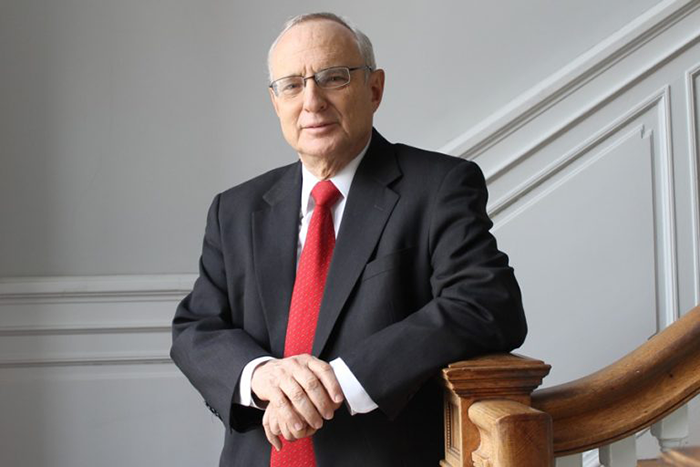
Rabbi David Saperstein still remembers the exact moments before he became the executive of the Religious Action Center of Reform Judaism.
“It was 11:04 a.m. on September 8, 1974,” he says, “which I know because when I crossed the George Washington Bridge, Gerald Ford came on the radio and spoke to the nation to announce that he was pardoning Richard Nixon.”
That sharp memory and hawk-eyed attention to detail are just two attributes that make Rabbi Saperstein a modern-day giant in the fight for social justice.
This year, the Reform Movement is celebrating 50 years of Rabbi Saperstein’s leadership. In 2015, he served as the U.S. Ambassador-at-Large for international religious freedom, making him the country’s chief diplomat on religious freedom. He later returned to the Reform Movement as the RAC’s director emeritus and senior advisor to the Union for Reform Judaism.
It’s impossible to distill 50 years of work into one article, but Rabbi Saperstein shared some of the highlights of his career with us, as well as a few lessons.
Let your passion guide you.
“Do justly, love mercy, and walk humbly with your God.” – Micah 6:8
“I always thought of religion and law as the two professions that allowed you to both help individual people and change society,” says Rabbi Saperstein, who holds a law degree from American University and taught both church-state law and Jewish law at Georgetown University Law Center for 35 years. “I had a passion for making a difference in the world, and [leading the RAC] put those two passions together.”
“I wanted to make America everything it could be,” he continues, “in terms of a land of justice and equality and compassion for all its citizens and a light to the world.”
Cherish your predecessors.
“Make for yourself a mentor, acquire for yourself a friend, and judge every person as meritorious.” (Pirkei Avot 1:6)
“As I was coming into this work, many of the great figures of the mid-20th century battles for social justice were at the end of their careers,” Rabbi Saperstein recounts. “They were very generous; many of them nurtured and mentored me in ways that had a profound impact on my life.”
Among his many mentors were Reform Jewish leaders like Rabbi Alexander Schindler, Jane Evans, Roland Gittelsohn, and, most influentially, Saperstein’s dear friend Al Vorspan. Starting in the 1980s, he was also deeply impacted by the mentorship of the liberal author and icon Leibel Fein. He recalls, too, civil rights activists from the NAACP and the Leadership Conference on Civil Rights, along with a number of key members of Congress who guided and helped him.
“When I think about what has been most personally important to me in my career, one is that I was blessed to get to know these people.” Rabbi Saperstein reflects.
Work across differences.
"The righteous of all nations shall have a share in the world to come." (Tosefta Sanhedrin 13:2)
Rabbi Saperstein believes that interfaith partnerships and bipartisan cooperation are critical to pursuing social justice. He has chaired or sat on the boards of many such endeavors and notes with pride that his successor, Rabbi Jonah Pesner, has expanded this vital coalitional work.
“I can't think of a single achievement that the Jewish community regards as a great social achievement of America that did not happen because of a bipartisan coalition of decency on Capitol Hill,” he says. “All of these achievements [in labor, women’s rights, civil rights, and Soviet Jewry and pro-Israel advocacy] have been thanks to a bipartisan, multi-issue, multiracial, multi-ethnic, multireligious coalition of decency from every community in America.”
In recent years, intensifying political partisanship has made for an increasingly divisive environment. But Rabbi Saperstein remains committed to working across lines of difference to create change.
“Some of the issues I work on as passions of my heart, like international religious freedom and combatting human trafficking, are still seen as bipartisan,” he explains, “so I still function in a world in which I have access to people across the political spectrum.”
For social justice’s sake, he hopes to see an overall return to the ability to partner across party lines. “As daunting as may be, it’s imperative that we re-establish such bipartisan cooperation if we are to address the most urgent issues facing America and humanity today.”
Nurture the next generation.
“Train up a child in the way they should go, and even when they are old, they will not depart from it.” (Proverbs 22:6)
At the end of his first year at the RAC, Rabbi Saperstein was offered funding to hire an additional full-time staffer.
“Instead, I wanted to use that money to create what’s now the Eisendrath Legislative Assistant Program,” he recalls. “Almost immediately, the program gave the RAC a sizable staff and the ability to handle a broad range of issues.”
Each year, a group of new legislative assistants spend one year at the RAC, playing a pivotal role in its advocacy and organizing work. Most go on to pursue careers in public policy, Jewish life, law, academia, and an array of social justice causes. To date, nearly 120 alumni have become rabbis and cantors.
“I remember the day I realized that the president of the Central Conference of American Rabbis and both the director and chair of the Commission on Social Action were all alumni of the LA program,” Rabbi Saperstein says. “That's an extraordinary feeling.”
He also reflects on founding, with other RAC staff, the Bernard and Audre Rapoport L'Taken Social Justice Seminar. Since its inception, it has touched the lives of some 70,000 Jewish high school students.
“Both the LA program and L’Taken have cultivated leadership that has helped strengthen the social justice work of the American Jewish community,” he says. “Of all the achievements in my career, if I had done nothing else, those would be the things I'm proudest of.”
Stay open to new opportunities.
“It is not incumbent upon you to complete the work, but neither are you free to desist from it.” (Pirkei Avot 2:15-16)
Rabbi Saperstein proudly held a number of government positions throughout the years, chairing two federal advisory committees/commissions and serving on three others. Still, he initially hesitated at the opportunity to become the U.S. Ambassador-at-Large for International Religious Freedom because he felt he wasn’t done at the RAC.
“Then my wife, Ellen, said, ‘You’ve been at the RAC 40 years now. If you're ever going to do something else, this is the time and the cause and the position,’” he remembers. “It was like a switch went off.”
“This was the right move if I was ever going to leave to do something else that I really cared for and could make a difference — in a very different way than my work at the RAC.”
Love what you do.
" Who is rich? One who is happy with what he has." (Pirkei Avot 4:1)
Rabbi Saperstein thinks back to half a century ago, when he first accepted the position of leading the RAC. “This job put together my two passions — social justice and Judaism — to try to make America a country that lives up to the extraordinary ideals it has asserted as its identity and given to the world as a model to strive for.”
After all these years, what keeps him motivated to continue? That’s an easy one, he says: “I still love this work as much today as I did when I walked in the door that Monday in 1974.”
Join us Wednesday, October 30 at 8:00 P.M. ET on Zoom to celebrate Rabbi Saperstein's 50 years of leadership and dedication to justice.
